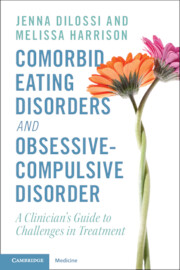 Comorbid Eating Disorders and Obsessive-Compulsive Disorder
Comorbid Eating Disorders and Obsessive-Compulsive Disorder from Part III - Evidence-Informed Considerations for Assessment and Treatment
Published online by Cambridge University Press: 14 December 2023
Effective assessment is crucial in treating patients with comorbid OCD and EDs. It is important for providers to create comprehensive treatment plans by combining current empirical evidence, their own clinical judgment, and the patient’s willingness to participate in interventions. The success of this process largely depends on the thoroughness of the initial assessment and ongoing follow-up. There is no established treatment manual or approach for addressing both disorders, so a comprehensive approach that combines current empirical evidence, clinical judgment, and the patient’s willingness to participate in interventions is needed. Medical stability is of utmost importance when treating individuals with EDs. Identifying the chief complaint can be difficult due to the overlap of symptoms, and understanding the timeline of symptoms and data from assessment measures is useful, but understanding the specific rituals, rules, and avoided stimuli is the true key to identifying which disorder should be targeted more.
To save this book to your Kindle, first ensure [email protected] is added to your Approved Personal Document E-mail List under your Personal Document Settings on the Manage Your Content and Devices page of your Amazon account. Then enter the ‘name’ part of your Kindle email address below. Find out more about saving to your Kindle.
Note you can select to save to either the @free.kindle.com or @kindle.com variations. ‘@free.kindle.com’ emails are free but can only be saved to your device when it is connected to wi-fi. ‘@kindle.com’ emails can be delivered even when you are not connected to wi-fi, but note that service fees apply.
Find out more about the Kindle Personal Document Service.
To save content items to your account, please confirm that you agree to abide by our usage policies. If this is the first time you use this feature, you will be asked to authorise Cambridge Core to connect with your account. Find out more about saving content to Dropbox.
To save content items to your account, please confirm that you agree to abide by our usage policies. If this is the first time you use this feature, you will be asked to authorise Cambridge Core to connect with your account. Find out more about saving content to Google Drive.